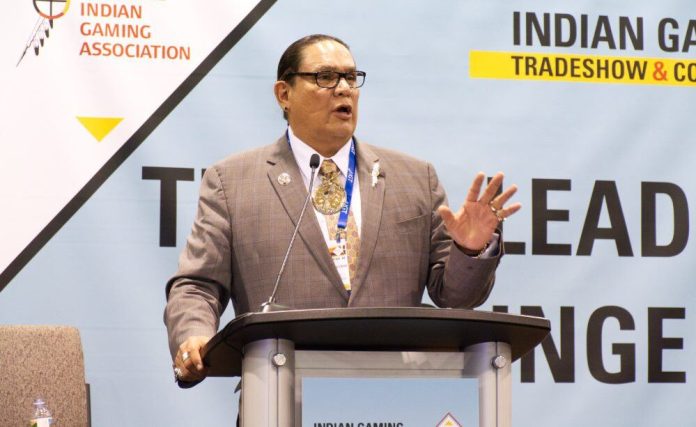As Congress weighs further budget cuts to Indian Country that would put more pressure on tribal revenue sources such as gaming, Native American leaders said they will be stepping up their opposition in the coming weeks and months to thwart any new measures.
Indian Gaming Association (IGA) Chairman Ernie Stevens and other tribal leaders made that clear when they appeared at last week on IGA’s webinar “The New Normal: Standing Guard – Tribal Gaming’s Response to Federal Rollbacks.”
From energy to economic development to gaming oversight, the Trump administration’s second term is already reshaping federal Indian policy in ways that will have lasting consequences, said IGA Conference Chair Victor Rocha.
“Amid proposals to weaken regulatory safeguards, shift agency priorities, and reinterpret foundational laws, tribal governments and institutions are being forced to adapt and push back,” Rocha said.
Stevens said tribes have to fight and stand up for their rights without doing it in a mean-spirited way. IGA plans to educate Congress and the Trump Administration on tribal sovereignty, and help them understand the impact of cuts that go beyond Native Americans even when going after tribes.
“We have to work with this Administration and show them who we are and teach them who we are and advocate about who we are so they understand,” Stevens said. “I’m not going to disrespect anybody, but I’m going to stand up to anybody that comes at tribal sovereignty and comes at our education and comes at our health and welfare. I am going to talk to them like a gentleman and a warrior. I’m going to be strong for Indian Country. That’s our battle right now.”
Stevens, Rocha and IGA Executive Director Brian Giles discussed how the tribal gaming industry is responding to this volatile political moment, including what’s at risk, what has already changed, and how they say IGA is standing guard to protect tribal rights, programs, and economic progress.
In the proposed budget of the Trump Administration, Giles said the cuts are severe and deep, with tribal education and health care funding among those items at risk.
“The challenges haven’t changed for Indian Country,” Giles said. “All our programs are on the chopping block. In normal times when the President sends over a budget to Congress it’s more of a suggestion. It never looks the same, and the President barely gets what he wants. But with this Congress they do whatever Trump tells them. When they send over a budget that calls for 40% cuts at the Bureau of Indian Affairs and even worse cuts than that in other programs, we have to take it seriously. The fight is in another month on what the future of Indian Country programs are going to look like.”
Giles said while that battle is shaping up in Washington, D.C., tribes are already talking with federal partners. He said he’s worried about the future of some less-well-off tribes.
“Tribes have a right to be extremely worried, especially with education and housing and where that’s all going,” Giles said. “You pass a One Big Beautiful Bill that’s going to add $3.5 trillion to the national debt while slashing a whole punch of programs for Medicaid, Medicare and SNAP while bulking up the Department of Homeland Security and Defense. I don’t know how Indian Country can survive some of these cuts and at some point we are not going to have much left to lose in terms of pushing back on this Administration and letting them know when enough is enough.”
Giles said most of the funding changes won’t take effect until after the 2026 midterm elections, with others delayed until 2028 to give states more time to prepare for them.
Stevens reiterated that he’s trying to keep his “demeanor in the right place” and made it clear when attending the recent Oklahoma Indian Gaming Association Conference & Trade Show that local tribal leaders are the best lobbyists to their members of Congress.
“The leadership, whether it’s our leaders in Washington or leaders in Indian Country, we have to take a stand and let them know that we stand on behalf of our communities, treaties and agreements and compacts that we have,” Stevens said. “We need to protect tribal sovereignty and the future of our children.”
Tribal gaming has created 700,000 jobs, and tribes shouldn’t have to fight for something written in compacts and treaties, Stevens added. “If we don’t fight for what’s right and legally ours in Indian Country then we’re going to have to start over,” he said. “We can’t afford that.”
Rocha said this term of the Trump Administration is more aggressive toward programs that Indian Country is dependent upon, including education. He’s said he’s worried about the financial pressure tribes are facing.
“Tribal gaming has elevated tribes and generated revenue that wasn’t there 30 years ago,” Rocha said. “Now it seems like there’s a financial shift again. You’re going to start seeing a financial shift to the tribes.”
Giles said it’s more than education cuts tribes are facing. It’s housing cuts to tribes by 33%, which he called “a wipeout.” There have also been cuts at the Department of Energy that impact tribes, placing more financial pressure on them.
While expressing concerns, Giles said one positive is that President Trump is the one person capable of telling governors of states who are trying to impede tribal gaming to “knock it off” because they are sovereign entities.
“I don’t know if we’ve ever had a President tell a state that or a governor that,” Giles said. “He will do that. There are ways we can return sovereignty to Indian Country.”


